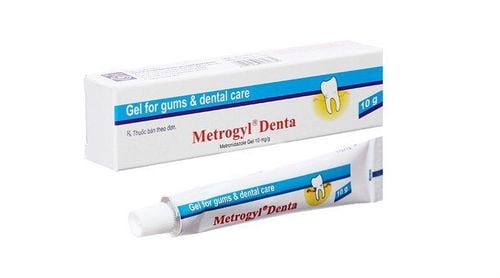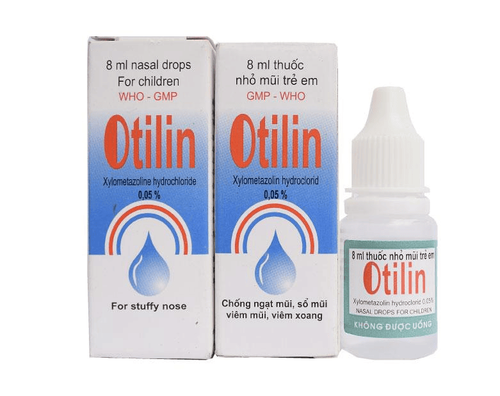This is an automatically translated article.
A feeling of a salty taste in the mouth is sometimes a normal symptom. However, this can also be a sign of many local or systemic diseases. While it's usually not cause for concern, you should still see your doctor if you have a salty taste in your mouth that's accompanied by other symptoms.1. Dry mouth
Along with a salty taste in your mouth, you may also feel like you have cotton balls in your mouth. This is called dry mouth syndrome (xerostomia). The condition can be caused by tobacco use, by aging, or as a side effect of medication.You may also experience:
Plaque in your mouth Thick saliva Bad breath Sore throat Hoarse voice Grooved tongue Dry mouth will usually go away on its own. Just make sure you drink enough water and avoid spicy and salty foods until the symptoms subside. You can also use sugar-free gum or over-the-counter mouthwashes to help stimulate saliva production.
2. Dehydration
Dehydration is another common cause of a salty taste in the mouth. And it can come on suddenly or gradually. Some people may experience sudden dehydration after an episode of diarrhea or vomiting. Some other patients may become dehydrated slowly after vigorous exercise in the heat.You may also have other symptoms of dehydration:
Extreme thirst Urinating less often Dark urine Tiredness Dizziness Feeling tired Doctors recommend drinking six to eight glasses of water equivalent to about 2 liters of water per day. You may need more water if you are sick, or the weather is very hot, or if you exercise vigorously.
If left untreated, dehydration can lead to serious complications. You could develop seizures, heat exhaustion or kidney problems, or even a life-threatening condition called hypovolemic shock. Most adults can recover by drinking more fluids. In severe cases, you may need to be hospitalized for intravenous fluids and electrolytes.

Mất nước là một trong các nguyên nhân phổ biến khiến miệng có vị mặn
3. Bleeding mouth
When you feel a salty or metallic taste in your mouth, it could be a sign of mouth bleeding. It can be caused by eating sharp foods, like potato chips, or brushing your teeth too hard.If your gums regularly bleed after flossing or brushing, you may have gum disease (gingivitis). This is a common condition that causes your gums to become sore and swollen over time.
If left untreated, gum disease can cause an infection. If you are experiencing bleeding gums or mouth, unexplained pain, see your dentist.
4. Oral infection
If left untreated, gingivitis can cause an infection called periodontitis. If caught early, periodontitis will not cause any long-term effects. But in severe cases, periodontitis can damage your jawbone and teeth.If your gingivitis has turned into periodontitis, you may experience:
Bad breath Loose teeth Gum abscess Pus under the teeth Bleeding can also be the first sign of other infections, for example oral thrush. This is an infection caused by yeast that grows in the mouth. You may see white patches in your mouth or a burning sensation. While some people experience a salty taste in their mouth, others may lose their taste buds.
It is also possible that the cause of the salty taste is the human papillomavirus (HPV). Although the virus usually causes no symptoms in the early stages, you may experience symptoms such as hoarseness or coughing up blood as the infection progresses.
5. Nasopharyngeal discharge
Nasal discharge when you have sinusitis or allergies also causes a salty feeling in the mouth. Mucus from the nose accumulates in the throat, which, if mixed with saliva in the mouth, can produce a salty taste. You also have a stuffy, runny nose, or trouble breathing.Many colds and allergies will gradually go away on their own. Treatments include building resistance, resting and staying hydrated, blowing your nose or taking cold medicine or antihistamines. Salt water sprays or mouthwashes also help relieve symptoms and clear nasal passages.
You should see a doctor if you have:
Symptoms persist for more than 10 days High fever Sinus pain Yellow or green nasal discharge Bloody nose
6. Acid or Bile Reflux
A sour or salty taste in the mouth can be a sign of acid or bile reflux. These conditions may occur together or separately. Although their symptoms are similar, acid reflux is caused by stomach acid flowing into the esophagus, and bile reflux is caused by bile from the small intestine flowing into the stomach and esophagus.You may also experience:
Severe pain in your upper abdomen frequent acidity Nausea Vomiting bile Cough or hoarseness Unexplained weight loss If left untreated, reflux can lead to reflux disease gastroesophageal reflux disease (GERD), a precancerous condition known as Barrett's esophagus, or esophageal cancer. Lifestyle and diet changes, medications, and even surgery can help treat reflux.

Miệng có vị mặn có thể là dấu hiệu của trào ngược axit hoặc mật
7. Undernutrition
You may have a salty or metallic taste in your mouth if your body is lacking in certain nutrients. Deficiencies can develop quickly or over several years.You may also experience:
Fatigue Irregular heartbeat Paleness Personality changes Confusion Numbness in your arms and legs Nutritional deficiency treatment is specific to the vitamin your body is lacking. Example:
Folate deficiency is treated by eating a balanced diet and taking prescription folate supplements.
A vitamin B12 deficiency may respond well to changes in diet. Some people may need to take a supplement in pill form or a nasal spray. Others may need a B12 shot if the deficiency is severe.
Vitamin C deficiency is treated with supplements. Eating more foods containing vitamin C can also help.
8. Sjögren .'s syndrome
Sjögren's syndrome occurs when your immune system attacks all of the moisture-producing glands in your body, including the salivary glands and tear ducts. This can lead to a salty taste or dry mouth and dry eyes.You may also experience:
Joint pain Dermatitis Vaginal dryness Dry cough Fatigue This condition can be accompanied by other autoimmune disorders, such as lupus or rheumatoid arthritis. Many people can manage their oral symptoms by using OTC treatments, like rinsing or drinking more water. Others may take prescription medication or undergo surgery.
9. Other possible causes
A salty taste can also be caused by:Neurological causes: A cerebrospinal fluid (CF) leak can occur when there is a tear or hole in the membrane that surrounds your brain. The hole allows the fluid that surrounds the brain to escape and drain into your nose and mouth. See your doctor if you notice a leak as well as nausea, vomiting, stiff neck, or changes in perception. Hormonal changes: Your gums may bleed or become more sensitive during pregnancy. Therefore, a metallic taste is common, but the changes are individual to each woman. Menopause is another time when women can experience a change in appetite. Medication side effects: There are more than 400 medications that can cause a salty taste in your mouth. The drug can also cause dry mouth and a host of other side effects. If you suspect your medication is altering your taste, talk to your doctor. Side effects of chemotherapy: People undergoing cancer treatment with chemotherapy often report changes in taste due to damage to the taste buds and salivary glands. Dry mouth is also common, especially in people undergoing radiation treatment for head and neck cancer.
10. When to see your doctor
Many conditions that cause a salty taste in the mouth are easily treatable once the underlying cause is discovered. Mention any taste changes you experience with your doctor. If the change is sudden and accompanied by other symptoms or signs of infection, you can seek immediate medical help.Please dial HOTLINE for more information or register for an appointment HERE. Download MyVinmec app to make appointments faster and to manage your bookings easily.
Reference source: healthline.com












